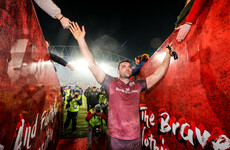THERE IS A strict schedule of events that the build-up to a major Republic of Ireland fixture must follow.
Firstly, the naming of an oversized provisional squad. Martin O’Neill normally reels off a list of every living Irishman, with Ashley Grimes and Davy Langan on the standby list alongside Fr Brian D’Arcy and Bosco.
Then there is the Minor Injury Scare. Aside from the physical wellbeing of the players, there really is not much else going on before an Ireland game, so the media await updates on, say, the health of Jonathan Walters’ knee as if he were an elderly relative battling a terrible disease.
Also at some point in the week, the FAI will ask the manager to launch a new sponsorship deal. In the Trapattoni era this meant photocalls of the genial Italian leering inappropriately at bikini-clad models, but things have moved on since then.
This week, new sponsor Rustlers came on board, the purveyor of pre-packaged burger goodness getting Martin O’Neill to pose in front of raging plumes of flame, providing ample Roy Keane-related gag material.
Finally, just when the country needs ratcheting up into a fit of righteous indignation, comes the all-important Damning With Faint Praise. This is the moment when someone asks the unsuspecting opposing manager or captain what they make of this Irish lot anyway, and they scratch their heads for a few seconds before mumbling something about long balls and fighting spirit.
This is, of course, a grievous insult to us, what with our long history of cultured football and mild manners, so we vow to shove a long ball up their arses in retribution.
Austria captain David Alaba fulfilled his role to the letter this week.
“Ireland will be aggressive. Sometimes they try to play it out but they also play a lot of long balls,” the Bayern Munich man read from a dog-eared manuscript entitled ‘Republic of Ireland For Dummies’.
How dare he!
The thing we never realise is that the likes of Alaba, and all those before him, are trying to be nice. They’re not necessarily saying aggression and long balls, the Alpha and Omega of Irish football culture, are a bad thing. In fact, they are usually quite worried about how their delicate continental palates might cope with our meat and potatoes.
“Ireland is a very difficult opponent to start the qualification with,” said Serbia captain Branislav Ivanovic before the sides met last September. “But we have trained for this type of play, so we can do well.”
Joachim Löw’s analysis of Germany’s defeat to Ireland focused on our lethal weapon: “We avoided 99 of those long balls but the 100th was one too many.”
But while Didier Deschamps spoke condescendingly of our martial spirit before the Euro 2016 clash with France — “This famous fighting spirit… it’s almost a genetic quality they have,” he cootchy-cooed — it wasn’t all pats on the head: “What I’ve seen is that they can play the ball on the deck even if they tend to play a more direct game.”
Deschamps had spotted that Ireland, in the interludes between flailing pitchforks and screaming fury, are at their best when they mix in a spot of Fancy Dan with the Plain Jane. Deschamps would almost certainly have been referring to the victory over Italy, and any really good performance by the team in recent times has had that same combination of construction and aggression.
The play-off defeat of Bosnia, the good bits at the Euros, the wins in Moldova and Austria away, the friendly victory over an admittedly disinterested Uruguay, all came from Ireland taking the game to the opposition and playing with confidence and élan.
When they are gripped by tentativeness and caution — Serbia away, Georgia and Wales at home — they are far less impressive. Granted they came through those games undefeated; but this feels like a big moment, one to be seized, not scrapped for.
Austria’s problems are well-publicised: the Euro 2016 flop; just seven points from five matches in Group D; coach Marcel Koller facing the sack; defender Andreas Ulmer scheduling his wedding to clash with the game; the absence of key players like striker Marc Janko and Marko Arnautovic. They are clinging to the precipice — it’s time for Ireland to trample on their fingertips.
Unlike in March when injury and suspension hampered their ability to take the game to Wales, Ireland now have the players to do just that. Seamus Coleman, James McCarthy and Shane Long will be missed, but Robbie Brady, Jeff Hendrick and Wes Hoolahan are there, James McClean’s confidence has clearly survived a season on the West Brom bench and, as befits his political leanings, Harry Arter provides a strong and stable presence in midfield.
Back in 2009, Ireland’s current assistant manager reacted to another big moment in typical style.
“France were there for the taking but Ireland never grabbed it — as usual,” Roy Keane said of the Thierry Henry controversy. “They were afraid of that next step. Mentally not strong enough.”
One wonders if he will use some variation of those words this weekend.
Annoyance at the condescension towards our style of play comes from an insecurity about our place in the football world, but victory on Sunday would put Ireland in a strong position to qualify for their third tournament in the last four.
It’s time to throw off the inferiority complex and take that next step.
















Excellent article and a brilliant summation of where this current Ireland side is at . Hopefully Martin O Neill allows the side to express themselves rather than play with fear .
Comical gag regarding Harry Arters political support !!
Love it!!
Excellent article tommy
What dose Roy Keane do for the ROI team ? Talk !
Great fun! COYBIG!